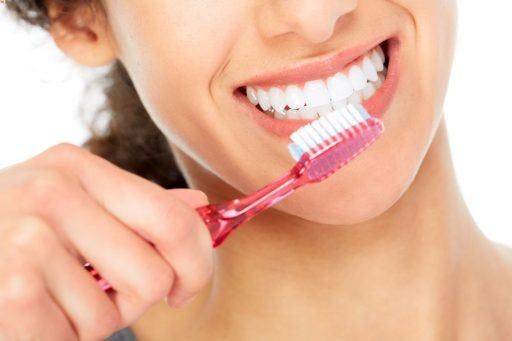Dealing with tooth sensitivity might mean struggling to enjoy your favourite foods or failing to maintain consistent oral hygiene habits. Ironically, having sensitive teeth can even compel you to skip dentist appointments out of sheer dental anxiety.
The question is, what do you really know about the condition? Some believe sensitivity always points to cavities, while others swear you can permanently treat it with home remedies. Spoiler alert: Both assertions are untrue. Shocking! Curious to know what else isn’t true? Here’s the truth behind some common misconceptions about tooth sensitivity.
Misconception #1: Brushing Leads to Sensitivity

No, brushing your teeth doesn’t directly cause sensitivity, but brushing too often and vigorously does. Experts call it “overbrushing” – a bad habit that can put you at risk for toothbrush abrasion, sensitive teeth, and gum recession. When you brush too hard, you can wear away the dental enamel protecting the sensitive inner tooth over time.
Once that exterior thins out or becomes damaged, it can expose the dentin layer underneath. “When a stimulus directly contacts the dentine, it may cause pain from the nerve,” explains the Australian Dental Association. Improper brushing, especially near the gumline, can also lead to bleeding, irritated gums, and other gingival issues.
Misconception #2: It’s Always a Sign of Tooth Decay
Tooth decay (a.k.a. dental caries or cavities) results from bacterial buildup that gradually weakens the enamel and exposes the dentin. As a result, you might experience sensitive toothaches. However, not every case is solely attributable to tooth decay. If you’re experiencing sensitivity across multiple teeth with no visible signs of cavities, you may be dealing with dental erosion, gum disease, or other problems.
Misconception #3: Cold Foods are the Only Triggers
Most people complain of tooth sensitivity pain when consuming something chilly, like ice cream or smoothies. This sensation happens because the dentin connects to nerve endings in the tooth pulp. When external stimuli (such as temperature changes) reach this layer, it leads to a sharp, sudden pain in your mouth. But cold treats aren’t the only things that can prompt this reaction.
Hot, sweet, and acidic foods or beverages can also trigger sensitivity. If you have an underlying oral health condition, even chewing can be an uncomfortable experience, as it stimulates the nerves.
Misconception #4: Clear Aligners Cause Teeth Sensitivity

As established, overbrushing leads to dental erosion by “wearing down” the tooth’s surface. It can also cause gums to recede, exposing the dentin and tooth root. Constant exposure to acidic substances, like food, drink, or stomach acid, is another primary cause. These factors and habits weaken the enamel over time. And the more compromised your enamel is, the more sensitive your teeth become.
Clear aligners can’t cause sensitivity since these orthodontic appliances can neither erode enamel nor recede gums. In other words, they can’t “make” your teeth more sensitive the way overbrushing or acids might. And according to the Australian Society of Orthodontists, there’s “research to suggest that people who opt for [this treatment] are actually less likely to suffer from sensitive teeth.”
Specifically, one 2021 study published in the European Journal of Orthodontics found that “patients treated with clear aligners experienced lower pain levels, less anxiety, and higher [oral health-related quality of life] [vs] those receiving fixed appliances.”
So, yes, you can safely and comfortably undergo aligner therapy with ClearCorrect. You may experience discomfort during the adjustment period, but it should taper off within a few days. This is normal at the start of treatment as your teeth move into their proper positions. But if you notice persistent pain or sensitivity, it may signal a deeper problem. It’s best to talk to your treating doctor.
Misconception #5: Toothpaste and Pain Relievers are Enough to Treat It
Now, you might be thinking, “How do I fix tooth sensitivity?” Densensitising toothpaste can help treat sensitive teeth with certain ingredients, including potassium nitrate, arginine and calcium carbonate, and strontium chloride. These specialised formulas work by either soothing tooth nerves, creating a protective barrier over delicate dentin, or both.
Over-the-counter pain medicine can also provide temporary relief. However, these measures aren’t enough to soothe all cases of sensitivity, especially if there’s an underlying cause you’re not addressing.
If tooth decay is the issue, you might need fillings, crowns, root canals, or other in-chair treatments to tackle it properly. Maybe your problem is teeth grinding – in which case, you might need to get a night guard for protection. If your enamel is extremely eroded, your treating doctor may need to apply fluoride gel or varnish on your teeth.
Ultimately, the only way to know if you have the right treatment plan for your case is to see a dental professional for an assessment. Don’t rely on your own “diagnosis” or self-medication to treat long-term sensitivity, as you risk doing more harm than good.
Where tooth sensitivity is concerned, prevention will always be better than cure. Lower your risk of developing it by observing proper oral hygiene (no overbrushing!), limiting your intake of sugary or acidic foods, and seeing your dentist regularly.
References:
Australian Dental Association (ADA). (n.d.). Sensitive teeth. Teeth.org.au.
Gao, M., Yan, X., Zhao, R., Shan, Y., Chen, Y., Fan, J., Long, H., & Lai, W. (2020). Comparison of pain perception, anxiety, and impacts on oral health-related quality of life between patients receiving clear aligners and fixed appliances during the initial stage of orthodontic treatment. European Journal of Orthodontics, 43(3), 353–359.
Oral Health Foundation. (n.d.). Sensitive teeth. Dentalhealth.org.
The Australian Society of Orthodontists (ASO). (2023a, March 8). All you need to know about sensitive teeth and braces. Orthodontics Australia.
The Orthodontists. Why Do I Have Sensitive Teeth? | The Orthodontists Blog. theorthdontists.com.au.



